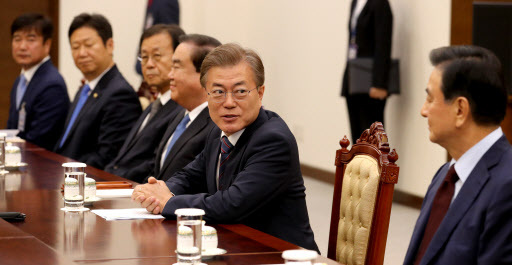South Korean President Moon Jae-in said Wednesday that his special envoys to the US, Japan and China have helped make up for what he called a monthslong diplomatic hiatus, also noting the country‘s diplomatic efforts have got back on the right track.
The president was apparently referring to a policy vacuum created by the March 10 ouster of his conservative predecessor Park Geun-hye.
“Our diplomacy has been in a state of vacuum due to the prolonged political impasse, but it appears (the envoys) have completely filled the gap with a single blow,” Moon said in a meeting with his envoys to the three countries.
 |
President Moon Jae-in (second from right) attends a meeting with his envoys to the US, Japan and China at the presidential office in Seoul on Wednesday. Yonhap |
The special envoys include Hong Seok-hyun, a former ambassador to the US, who traveled to Washington last week for a meeting with U.S. President Donald Trump and other ranking US officials.
Former Prime Minister Lee Hae-chan acted as Moon’s special envoy to China, while Rep. Moon Hee-sang of the ruling Democratic Party visited Japan as the new South Korean leader‘s messenger there.
The president thanked the envoys for making themselves available on such short notice. And then he thanked them for accurately delivering his messages that needed to be said, especially those concerning thorny issues such as the deployment of the THAAD US missile defense system and a controversial deal with Japan over its sexual enslavement of Korean women during World War II.
During his meeting with Hong at the White House, Trump expressed his hope to work closely together with Moon to strengthen the alliance and resolve the North Korean nuclear issue. Hong also met with US Secretary of State Rex Tillerson and congressional leaders for talks mainly on how to deal with the North Korean nuclear issue.
Moon and his special envoy to Japan have told Japanese leaders, including Prime Minister Shinzo Abe, that the South Korean people could not accept the 2015 agreement over sexual slavery.
Under the controversial deal, Tokyo agreed to provide 1 billion yen ($8.94 million) in compensation to thousands, if not tens of thousands, of South Korean women forced into sexual servitude. The money is also intended for dozens of Korean victims who are still alive.
The UN Committee against Torture has also acknowledged the compensation may not be enough to help and support the victims in a recently published report.
“As well as the THAAD issue and the sexual slavery issue, I believe we have said what needed to be said,” the president said.
“I need to hold summit talks with the leaders of those countries, and so I believe (such clear messages) have been meaningful also in the sense of setting the agenda for the summit talks,” he added.
The South Korean leader came into office on May 10, only one day after a rare presidential by-election caused by the removal of the former president over corruption allegations.
Moon has already agreed to hold a bilateral summit with his US counterpart in Washington in late June.
He is also expected to hold summit talks with Chinese President Xi Jinping and the Japanese prime minister.
For about a year, China has taken retaliatory steps against South Korean companies, including imposing restrictions on travel to Seoul, over the THAAD battery. Cultural products such as K-pop, dramas and movies have also taken the brunt of the retaliation.
But as of late, Seoul and Beijing are seen as moving toward mending strained ties as exchanges and contacts in diverse areas have apparently been gaining traction since Moon came into power this month.
All four leaders, including Trump, are also set to attend the G20 summit scheduled to be held in Hamburg, Germany on July 7-8.
Cho Yoon-je, Moon’s special envoy to the European Union and Germany, meanwhile wrapped up his visit to the EU headquarters in Brussels and Berlin after meeting with German Chancellor Angela Merkel on Wednesday, local time.
Seoul and Berlin are widely seen as having reached an agreement in principle to hold a bilateral summit in Berlin ahead of the G20. Cho, a professor at Seoul‘s Sogang University, also met with Markus Ederer, state secretary at the German foreign ministry, to discuss matters pertaining to North Korea.
Last Friday, Cho delivered Moon’s letter to EU Council President Donald Tusk in Brussels, in which Moon expressed hopes for a summit with him as soon as possible. (Yonhap)







![[From the Scene] At this Starbucks, you need ID: Franchise opens store with view of North Korea](http://res.heraldm.com/phpwas/restmb_idxmake.php?idx=644&simg=/content/image/2024/11/29/20241129050068_0.jpg)
